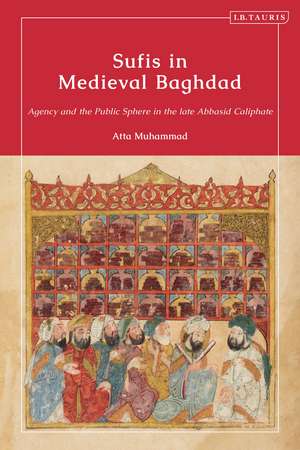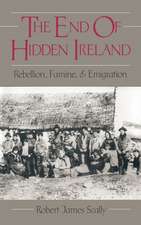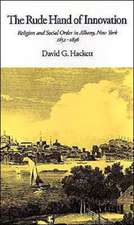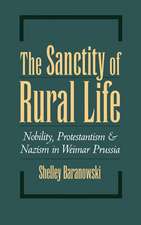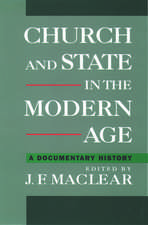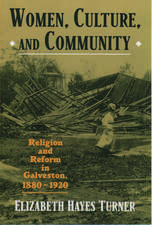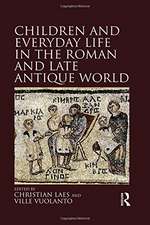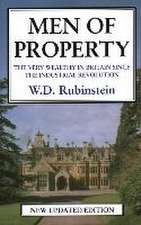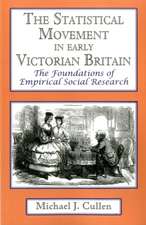Sufis in Medieval Baghdad: Agency and the Public Sphere in the Late Abbasid Caliphate
Autor Atta Muhammaden Limba Engleză Hardback – 15 noi 2023
Preț: 509.38 lei
Preț vechi: 730.59 lei
-30% Nou
Puncte Express: 764
Preț estimativ în valută:
97.47€ • 104.23$ • 81.27£
97.47€ • 104.23$ • 81.27£
Carte tipărită la comandă
Livrare economică 18 aprilie-02 mai
Livrare express 13-19 martie pentru 118.03 lei
Preluare comenzi: 021 569.72.76
Specificații
ISBN-13: 9780755647583
ISBN-10: 0755647580
Pagini: 192
Dimensiuni: 156 x 234 x 18 mm
Greutate: 0.45 kg
Editura: Bloomsbury Publishing
Colecția I.B.Tauris
Locul publicării:London, United Kingdom
ISBN-10: 0755647580
Pagini: 192
Dimensiuni: 156 x 234 x 18 mm
Greutate: 0.45 kg
Editura: Bloomsbury Publishing
Colecția I.B.Tauris
Locul publicării:London, United Kingdom
Caracteristici
Argues for the importance of the role of Sufism in creating a public sphere that existed between ordinary subjects and the government in Abbasid Baghdad
Notă biografică
Atta Muhammad is Lecturer at Talim-ul-Islam College, Pakistan. He holds PhD from the University of Leeds, UK.
Cuprins
AcknowledgementsTransliteration and Dates IntroductionChapter 1 The Concept of the Public Sphere in Medieval Islamic Societies Chapter 2 Spaces for the Public Good in Medieval Islamic SocietiesChapter 3 Baghdad in the Late Abbasid CaliphateChapter 4 The Ribat: An Institution of the Public Sphere Chapter 5 Sufis' Relations with the Ruling Authorities and their Contribution to the Public Sphere ConclusionAppendix: Maps and tablesBibliography
Recenzii
A fascinating study and snapshot into civic life in medieval Baghdad.
In this first comprehensive study of Sufism in medieval Baghdad, Atta Muhammad offers an insightful interrogation of the pivotal role played by Sufis, who worked for the common good alongside members of various segments of society, in the public sphere of the city during the late Abbasid period. Rich in substance and theory, this book advances our understanding of the concept, creation, nature, and operation of a vibrant and inclusive public sphere in medieval Islamic societies and the significance of Sufi agency therein beyond the temporal and spatial specifics.
This is an interesting and, in many ways, original book. It feeds into the growing body of literature which pushes back against the "orientalist" idea that medieval Muslim rulers were absolute and arbitrary dictators who had no sustained or fruitful interactions with their subjects. Instead Atta Muhammad shows how the Sufis were among a number of groups who articulated and represented popular concerns and, at least on some occasions, stood up to and confronted rulers and their ill-disciplined soldiery.
In this first comprehensive study of Sufism in medieval Baghdad, Atta Muhammad offers an insightful interrogation of the pivotal role played by Sufis, who worked for the common good alongside members of various segments of society, in the public sphere of the city during the late Abbasid period. Rich in substance and theory, this book advances our understanding of the concept, creation, nature, and operation of a vibrant and inclusive public sphere in medieval Islamic societies and the significance of Sufi agency therein beyond the temporal and spatial specifics.
This is an interesting and, in many ways, original book. It feeds into the growing body of literature which pushes back against the "orientalist" idea that medieval Muslim rulers were absolute and arbitrary dictators who had no sustained or fruitful interactions with their subjects. Instead Atta Muhammad shows how the Sufis were among a number of groups who articulated and represented popular concerns and, at least on some occasions, stood up to and confronted rulers and their ill-disciplined soldiery.
